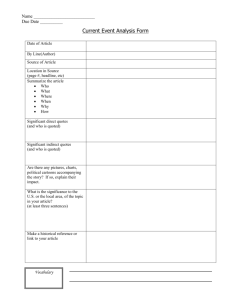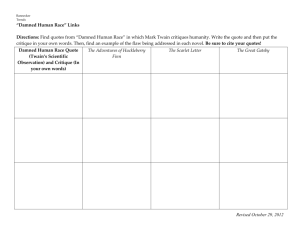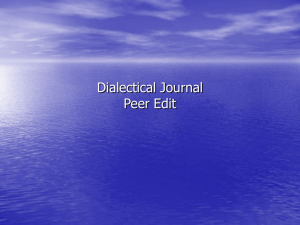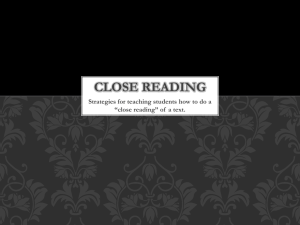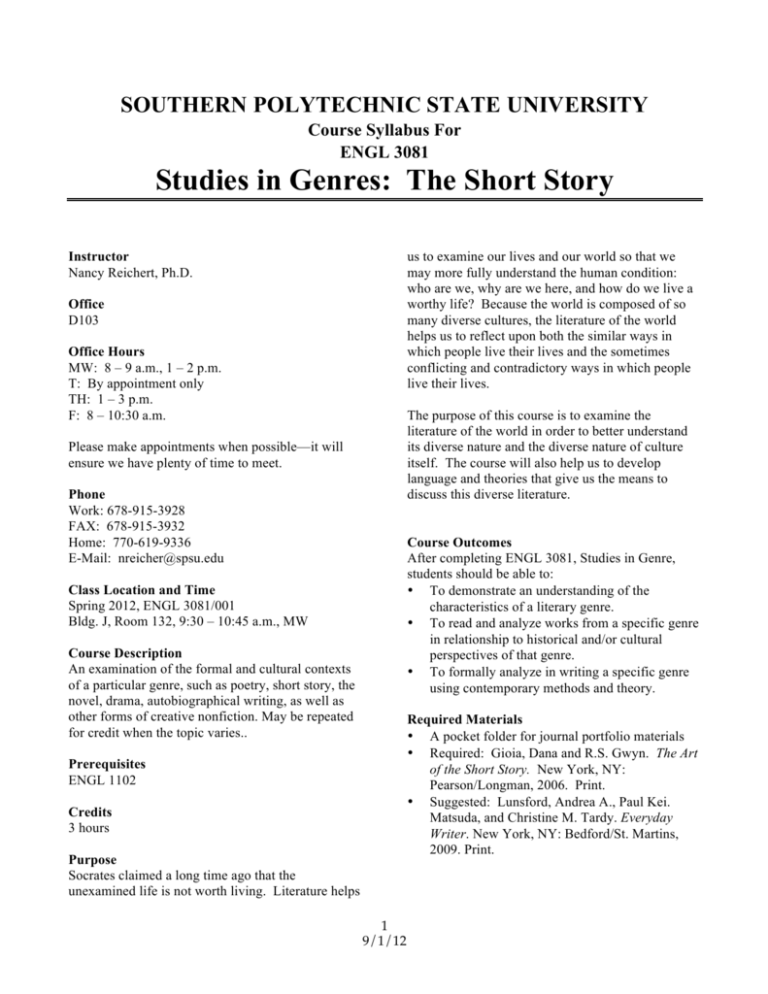
SOUTHERN POLYTECHNIC STATE UNIVERSITY
Course Syllabus For
ENGL 3081
Studies in Genres: The Short Story
Instructor
Nancy Reichert, Ph.D.
us to examine our lives and our world so that we
may more fully understand the human condition:
who are we, why are we here, and how do we live a
worthy life? Because the world is composed of so
many diverse cultures, the literature of the world
helps us to reflect upon both the similar ways in
which people live their lives and the sometimes
conflicting and contradictory ways in which people
live their lives.
Office
D103
Office Hours
MW: 8 – 9 a.m., 1 – 2 p.m.
T: By appointment only
TH: 1 – 3 p.m.
F: 8 – 10:30 a.m.
The purpose of this course is to examine the
literature of the world in order to better understand
its diverse nature and the diverse nature of culture
itself. The course will also help us to develop
language and theories that give us the means to
discuss this diverse literature.
Please make appointments when possible—it will
ensure we have plenty of time to meet.
Phone
Work: 678-915-3928
FAX: 678-915-3932
Home: 770-619-9336
E-Mail: nreicher@spsu.edu
Course Outcomes
After completing ENGL 3081, Studies in Genre,
students should be able to:
• To demonstrate an understanding of the
characteristics of a literary genre.
• To read and analyze works from a specific genre
in relationship to historical and/or cultural
perspectives of that genre.
• To formally analyze in writing a specific genre
using contemporary methods and theory.
Class Location and Time
Spring 2012, ENGL 3081/001
Bldg. J, Room 132, 9:30 – 10:45 a.m., MW
Course Description
An examination of the formal and cultural contexts
of a particular genre, such as poetry, short story, the
novel, drama, autobiographical writing, as well as
other forms of creative nonfiction. May be repeated
for credit when the topic varies..
Required Materials
• A pocket folder for journal portfolio materials
• Required: Gioia, Dana and R.S. Gwyn. The Art
of the Short Story. New York, NY:
Pearson/Longman, 2006. Print.
• Suggested: Lunsford, Andrea A., Paul Kei.
Matsuda, and Christine M. Tardy. Everyday
Writer. New York, NY: Bedford/St. Martins,
2009. Print.
Prerequisites
ENGL 1102
Credits
3 hours
Purpose
Socrates claimed a long time ago that the
unexamined life is not worth living. Literature helps
1
9/1/12
Important Web Addresses
My Homepage: http://fac-web.spsu.edu/tc/reichert/
Library: http://www.spsu.edu/library/
Hornet Connect: https://connect.spsu.edu/
This site will allow you to connect to important resources off-campus. “Library Resources” is your first option. It
will connect you to numerous databases associated with the Library.
Disabilities
Students with disabilities who believe that they may need accommodations in this class are encouraged to contact
the ATTIC at 678-915-7244 or at 678-915-7361 as soon as possible to ensure that such accommodations are
implemented in a timely fashion.
Attendance Expectations
•
•
•
As this course emphasizes the development of discussion skills, the ability to work responsibly in a group,
and the honing of critical thinking skills, participation in the class discussions and activities is crucial.
Excellent or perfect attendance/participation will be rewarded. For more information see the Portfolio
Evaluation section of this syllabus.
The professor reserves the right to fail students on their sixth absence.
General Use Computer Lab: The Knowledge Commons, Library
The IT General Use Computer Lab known as the Knowledge Commons is located in the library and is available
for students who need access to computers and printers.
Late Work
Late work will be penalized in this class. I expect you to come prepared with journal entries and other
assignments when they are due. There are at least two good reasons for this policy.
•
•
This class operates under the assumption that knowledge making is a social, communal act. Therefore, we
will share our written work and we will build knowledge as a community of learners.
It’s unfair to students who consistently turn work in on time to extend deadlines for other students. In many
ways we could all benefit from extended time to complete work; however, courses are inherently limited by
time since we only have a semester in which to work. Therefore, it’s necessary to hold students to the
established deadlines.
If you can't make class because of illness, but work is due, I expect you to e-mail it to me in time for class.
Otherwise, please bring work to class. I receive over 50 emails a day so your best bet to ensure you receive
timely feedback is to turn your entry in during class.
Exceptional problems will be considered when I take up journal portfolios. Exceptional problems should be
accompanied by doctor notes that indicate problems large enough to make it impossible to get the work to class
on time. Address your problems in your letters of reflection/self-evaluation.
Computer problems will rarely work as an excuse for late work. Therefore, save frequently when you are working
on your writing. Use the "save as" command and make sure you are saving to your disk drive when using the
computers at school. Don’t wait to print before class. Computers and printers do not always work. I understand
that problems do occur, but my understanding gets tested when work is continually late.
2
9/1/12
No research papers will be accepted after the due date. I may give clearance for exceptional cases, but
don't count on it.
You must take quizzes on the dates and times set in the schedule.
STUDENT HONOR CODE
SPSU has created the following honor code for students to follow. It is written in first person so each student
reads it as a pledge.
As a member of the Southern Polytechnic State University community of scholars, I understand that my actions
are not only a reflection on myself, but also a reflection on the University and the larger body of scholars of which
it is a part. Acting unethically, no matter how minor the offense, will be detrimental to my academic progress and
self-image. It will also adversely affect all students, faculty, staff, the reputation of this University, and the value
of the degrees it awards. I promise that I will not participate in any form of academic misconduct. I also
understand that it is my responsibility to hold others to these same standards by addressing actions that deviate
from the University-wide commitment to working, living, and learning in an environment conducive to a quality
education.
I recognize that the following actions will result in a charge of academic misconduct:
• Plagiarism, fabrication, or other academic misconduct may result in a grade of zero, a reduction in the
course grade, and possibly other penalties, including failure of the course, and dismissal from the
University.
• Any work submitted for credit must be completely the work of the individual student unless it’s part of a
group grade.
The above statements are pulled from and based on the SPSU Honors Code: http://spsu.edu/honorcode/. Please
go to this site to learn more about your rights and penalty actions.
THE ATTIC Writing Tutoring Services
The ATTIC tutoring services provide opportunities for individualized assistance to all Southern Polytechnic
students. Academic assistants help students through the processes of invention, organization, writing, revising,
and editing of essays and research papers. Those of you who are interested in getting another reader for your
papers may want to drop by the ATTIC. Those of you who really enjoy getting audience feedback on your work
will find the ATTIC to be a unique opportunity for such feedback.
The ATTIC is now located on the bottom floor of the Student Center.
General Use Computer Lab: The Knowledge Commons, Library
The IT General Use Computer Lab known as the Knowledge Commons is located in the library and is available
for students who need access to computers.
Evaluation
2 Quizzes (30%)
Quiz One: Readings during the eras of Romanticism and Realism (15%)
Quiz Two: Readings during the eras of Modernism, Post Modernism, Magical Realism, and Contemporary times
(15%)
Writings
Reader-Response Journals (40%)
Your journal portfolio will consist of two different parts. In the portfolio you will turn in the following items:
1. Individual Journal Entries
3
9/1/12
2. Reflection Paper
The journal portfolio will be graded based on the criteria I will hand out in a separate contract.
1. Individual Entries
On most Mondays a one-page, double-spaced, typed response to the literature for the week will be due. Students
need to respond to all of the readings for the week.
Example: Say you are supposed to read one short story for Monday and that you are supposed to read another for
Wednesday.
Your entry would have a section for the first short story—three quotes and responses to each quote. Your
entry would also have a section for the second short story—three quotes and responses to each quote.
A reader-response journal is a personal response to the literature we read. Your aim is to attempt to understand
the readings for yourself; do not worry about whether you are in agreement with your peers, literary critics, or
myself. See if you can connect the literature to pertinent issues or themes we discuss in class or to other pieces of
literature we read during the semester. See if you can connect the literature to your own life experiences.
The following format may get a bit redundant over the course of the semester, but it should help you to come
to a personal understanding of the text.
For responses to the short stories, I would like you to select at least three quotes that you see as important to
your understanding of the text itself. One of these quotes should be near the beginning of the text, another from
the middle, and the last one from the end of the text.
Type each quote down in your journal. Place quotation marks around the quote and place the page number in
parentheses after the quote.
Respond to the quote. Why did you pick it? What makes it interesting? What information does it bring to the
text? How does it impact your understanding of the text? Can you relate it to important issues or themes that
arise in the text? Can you relate it to another text we have read? Can you relate it to your own experience? You
will want to write at least one thoughtful response to each quote.
Do not simply sum up what the quote says. You cannot earn an A on the journal portfolio doing so.
I will select at random excerpts from student journals to be shared with the rest of the class on Wednesday.
Again, note that these excerpts are being selected at random and not because I think the authors have come up
with better responses than everybody else. Be prepared to have your writings shared with the rest of the
class.
When I return your journal entries to you, you will want to place them in a pocket folder to be turned in at the end
of the semester for a Journal Portfolio grade.
2. Reflection Paper
Use MLA format for this reflection paper. There is no set page length. I will be reading your paper to see
that you answer the following questions thoughtfully and completely. Do title your work in a creative way that
fits the content of your paper. In other words, I don’t want “Reflection Paper” as your title. It’s too general and
could be anyone’s title.
1) What strengths and weaknesses can I observe in my journal entries? What did I do well? What could I have
pushed more? Do note these entries aren’t graded for spelling and punctuation so you should answer these
questions in terms of content issues. Which responses were my most thoughtful? Why? Share the quote and
response and explain why they were thoughtful.
4
9/1/12
2) When I reread my journal entries, what do I learn about myself from reading them? Are there certain issues
that I seem drawn to? When I reread my journal entries, what do I learn about the literature we studied? What
does it tell me about the World? About the short story genre?
3) What connections can I make between pieces of literature? What writers seem to have similar ideas? What
writers see things very differently? What cultures seem similar? Different? Why? This is an important question-take some time and answer it well. What are the universal themes that all humans face that are discussed in the
literature? How are these themes discussed?
4) Using the criteria set up in the contract, what grade should I get for my journal portfolio? Why?
Participation
You can address participation, but it is not a part of the portfolio grade. Participation is a bonus in this class. If
you meet the following conditions, you may argue that your journal portfolio grade be raised a half letter grade.
• You have no more than three absences for the semester;
• You have been late no more than four times for the semester;
• You have been prepared for class. You have journal entries and papers completed before class and you have
read your materials ahead of time for class;
• You participate well in classroom activities such as small-group and full-class discussions. Participating well
means entering the dialogue among students and professor. Good participants listen well and add their ideas
to the dialogue.
Research Paper (30%)
If the purpose of reading literature is to help us examine our lives and our world so that we may better understand
our own values and the values of others, then it is important to make connections with a piece of literature and to
understand what it tells us about ourselves and about the world in which we live.
Pick a short story from our book that speaks to you in some way. Analyze the reasons why it speaks to you.
What does it seem to say that you relate to or that you find challenging? Why are the issues it addresses still
important to people today? Before you select a story, you may want to research it briefly to ensure that you
can find sources easily.
Also analyze the story in order to understand what it says about culture. What are the cultural issues raised in the
story? Remember, cultural issues often determine what we value and why, whether it be of a religious nature, an
economic nature, or an ethnic/racial nature. The cultural issue may even reinforce gender issues or challenge
them. Are any of these issues central to the text you read? How so and how do you respond to them? Notice you
do not have to discuss each of the cultural issues; pick one or two to analyze.
After you analyze the cultural issues, in what ways do you see these issues in today's culture(s)? How might this
have impacted how you responded to the text?
Once you have a strong sense of your own reading of the text, research it. See what literary critics have said.
You can pull in ideas from the critics that agree or disagree with your own views. Simply discuss their views and
then explain how and why your views are similar or different.
You do not have to organize the paper in the order that the questions above appear. Do ensure that you cover the
main issues listed above in your paper. Do make sure you follow the guidelines listed below:
• A five-page, double-space minimum for the paper. The works-cited page is a sixth page.
• MLA style should be used for margins, headers, spacing, and citing research.
5
9/1/12
•
•
•
•
You will want to find important quotes from the text you are analyzing and incorporate them in your paper.
Your chosen text is considered the primary source and it's important to quote from it and to list it on your
Works Cited page.
You will want to cite from at least three secondary sources for the paper and ensure that all three sources are
listed on your Works Cited page. Two of your sources must come from journal articles, books, and reference
materials that can be found in libraries or through databases. Print sources such as these are more critically
evaluated than any sources found at .COM's and even .EDU's on the web.
Sources such as Twentieth Century Criticism may be used. Twentieth Century Criticism is a set of reference
that can be found in the reference section of our library. There are many reference sources such as this in our
library. These sources are a good place to start because they often have excerpts from numerous critics cited
within them. Each critic counts as a source.
Carefully evaluate web resources before using them.
PROPOSED CALENDAR
Week One, January 9 - 13 (January 12—the last day to drop/add)
Monday: We will discuss works of literature as cultural artifacts, do brief introductions, and go over the syllabus.
Homework: Read the syllabus closely. You are responsible for its content. Read “Cultural Studies,” pp. 901 –
902. The book is on reserve at the library so use that copy if you have not yet bought a copy of the book.
Wednesday: Quiz over Syllabus. I will hand out the contract for the journal portfolio for discussion as well as a
handout giving examples of the various types of entries. We will then discuss the section on cultural studies.
Homework: Read Edgar Alan Poe’s “The House of Usher,” pp. 708 – 721. Poe was one of the first critics to
begin defining what a short story should entail. Read “The Tale and Its Affects,” p. 725 as well. While I will
not directly assign the bibliographical readings on the author, reading them may give you added insight into
the story.
Week Two, January 16 - 20
Monday: No class.
Wednesday: Discuss what is due in Journal entry 1 on Monday. I will give out a handout on Romanticism,
which we will discuss in relationship to “The House of Usher. As a class we will discuss what Edgar Alan
Poe says about the short story. We will also discuss the “House of Usher.”
Homework: Read Nathaniel Hawthorne’s “Young Goodman Brown,” pp. 348 – 357) and the first half of Herman
Melville’s “Bartleby the Scrivener: A Story of Wall-street,” pp. 600 – 613 (the end of the paragraph that
begins on p. 612. Write Journal 1: Write three quotes and responses for “Young Goodman Brown” and for
the first half of “Bartleby. Remember, you want quotes from the beginning, middle, and end—of course, your
last quote for “Bartleby” will really be at the middle of the full text. You may want to consider how these two
texts fit Romanticism.
Week Three, January 23 - 27
Monday: Journal 1 is due. Discuss Hawthorne’s “Young Goodman Brown.”
Wednesday: Discuss the first half of Melville’s “Bartleby.”
Homework: Read the second half of Melville’s “Bartleby the Scrivener: A Story of Wall-street,” pp. 613 – 626.
Read Guy de Maupassant’s “The Necklace,” pp. 591. Read Maupassant’s “The Realist Method,” pp. 597
598 as well. Write Journal 2: Three quotes and responses for the second half of “Bartleby” and three quotes
and responses for “The Necklace.”
6
9/1/12
Week Four, January 30 – February 3
Monday: Turn in Journal 2. Discuss the second half of Melville’s “Bartleby.”
Wednesday: Distribute handout on Realism. Discuss Realism, specifically French Realism in relationship to
“The Realist Method” and to “The Necklace.”
Homework: Read Willa Cather’s “Paul’s Case,” pp. 107 – 121. Read Kate Chopin’s “The Storm,” pp. 153 – 156.
Write Journal 3: Three quotes and responses for Cather’s “Paul’s Case.” Three quotes and responses for
Chopin’s “The Storm.”
Week Five, February 6 - 10
Monday: Turn in Journal 3. Discuss American Realism and Regionalism. Discuss Cather’s “Paul’s Case.”
Wednesday: Discuss Chopin’s “Story of an Hour.”
Homework: Read Stephen Crane’s “The Open Boat,” pp. 196 – 213. Read the first half of Nikolai Gogol’s “The
Overcoat,” pp. 311 – 322 (through the end of the last full paragraph_. Write Journal 4: Three quotes from
“The Open Boat” and three quotes from the first half of “The Overcoat.”
Week Six, February 13 - 17
Monday: Journal Entry 4 is due. We will discuss Naturalism and Crane’s “The Open Boat.”
Wednesday: We will discuss Realism in relationship to Russia and the first half of “The Overcoat.”
Homework: Finish reading “The Overcoat,” pp. 322 – 331. Study for Quiz 1 over Romanticism, Realism,
Naturalism and the short stories.
Week Seven, February 20 - 24
Monday: No Journal is due. Finish discussion of “The Overcoat.” Discuss the quiz on Wednesday.
Wednesday: Take Quiz 1.
Homework: Read Anton Chekhov’s “Misery,” pp. 147 – 151. Read the first half of Franz Kafka’s “The
Metamorphosis,” pp. 467 – 489 (end of Part II). Write Journal 5: Three quotes and responses for Chekhov’s
“Misery.” Three quotes and responses for “The Metamorphosis.”
Week Eight, February 27 – March 2. (October 12, last day to withdraw)
Monday: Journal 5 is due. Hand out information concerning Modernism. Discuss Modernism. Look at
Chekhov’s story through the lenses of Realism and Modernism.
Wednesday: Discuss the first half of Kafka’s “The Metamorphosis.”
Spring Break: March 6 – 9.
Homework: On Wednesday, March 14 your research topics are due. Complete Kafka’s “The Metamorphosis,”
pp. 489 – 500. Read Ernest Hemingway” A Clean, Well-lighted Place,” pp. 372 – 375 and F. Scott
Fitzgerald’s “Babylon Revisited,” pp. 247 – 262. Write Journal 6 on these readings: three quotes and three
responses on the second half of Kafka’s “The Metamorphosis, three quotes/responses for Hemingway’s “A
Clean Well-lighted Place.” Three quotes and responses for Fitzgerald’s Babylon Revisited.”
Week Nine, March 12 - 16
7
9/1/12
Monday: Journal 6 is due. We will discuss the second half of Kafka’s “The Metamorphosis and Hemingway’s
“A Clean, Well-Light Place.”
Wednesday: Research Topics are due--have author and title ready. Discuss Fitzgerald’s Babylon Revisited.”
Homework: Read Ralph Ellison’s “A Party Down at the Square,” pp. 218 – 222 and Shirley Jackson’s “The
Lottery,” pp. 390 – 396. Write Journal 7 on these readings: three quotes/responses for Ellison’s Party and
three quotes and responses for Jackson’s “The Lottery.”
Week Ten, March 19 - 23
Monday: Journal 7 is due. We will discuss Ellison’s “Party.”
Wednesday: We will discuss Jackson’s “The Lottery.”
Homework: Read James Joyce’s “Araby,” pp. 430 – 434. Write Journal 8 on Joyce’s “Araby”: Three
quotes/responses for “Araby.”
Week Eleven, March 26 – 30 (March 28 is the Last Day to Withdraw)
Monday: Journal 8 is due. Discuss Joyce’s “Araby.”
Wednesday: I will hand out information concerning Post Modernism, Contemporary Literature, Cross-cultural
texts, and Magical Realism. We will discuss these terms. We will head to the library for research.
Homework: Read Flannery O’Connor’s “A Good Man is Hard to Find, pp. 678 - 689” and Gabriel Garcia
Marquez’s “Wings.” Write Journal 9 on these readings: Three quotes and responses for O’Connor’s “A
Good Man is Hard to Find” and three quotes and responses for Garcia Marquez’s “Wings.”
Week Twelve, April 2 - 6
Monday: Journal 9 is due. We will discuss O’Connor’s “A Good Man is Hard to Find.”
Wednesday: We will discuss Garcia Marquez’s “Wings.”
Homework: Read Leslie Marmon Silko’s “The Man to Send Rain Clouds,” pp. 739 - 742 and Chinua Achebe’s
“Dead Man’s Path.” Write Journal 10 on these readings. Three quotes and responses for each story.
Week Thirteen, 10 - 14
Monday: Journal 10 is due. We will discuss Silko’s “The Man to Send Rain Clouds.”
Wednesday: We will discuss Achebe’s “Dead Man’s Path.”
Homework: Read Alice Walker’s “Everyday Use,” pp. 810 – 816 and Margaret Atwood’s “Happy Endings,” pp.
22 – 24. Complete your research paper and gather the necessary materials together for Monday.
Week Fourteen, 16 - 20
Monday: Turn in Research Paper, Research Notes and Research Drafts. No journal is due. Discuss
Walker’s “Everyday Use.”
Wednesday: Discuss Atwood’s “Happy Endings.”
Homework: Read Ha Jin’s “Saboteur,” pp. 420 - 427 and Ursula K. Le Guin’s “The Ones Who Walk Away from
Omelas,” pp. 531 – 535. Read Le Guin’s writing concerning her perspective about “The Ones Who Walk
Away From Omelas,” pp. 535 – 536. Write journal 11 on these readings.
8
9/1/12
Week Fifteen, April 23 - 27
Monday: Journal 11 is due. Discuss Jin’s “Saboteur.”
Wednesday: Discuss Le Guin’s “The Ones Who Walk Away from Omelas.”
Homework: Finish the journal portfolio for Monday. Read Sandra Cisneros’s “Barbie Q,” pp. 160 – 162.
Week Sixteen, April 30
Monday: The journal portfolio is due. Discuss Cisneros’s “Barbie Q.” Discuss Quiz 2.
Homework: Study for Quiz 2.
Final Exams: May 2 - 8
Quiz 2 on Final Exam Date (TBA).
We may not stick with this calendar exactly if we find that we need time to discuss or explore issues and ideas
that come up in more detail.
Final Statement
I know that I am asking you to do a lot of reading and writing; therefore, I want to let you know that most of my
students pass this course and with a bit of effort, they actually do quite well in it. If you put the time and effort
into being prepared for class, I will try to ensure that the class is interesting and worth your time. Good luck.
9
9/1/12


